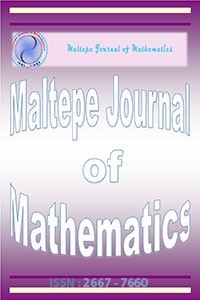
Maltepe Journal of Mathematics
Yazarlar: Şebnem YILDIZ
Konular:Matematik
Anahtar Kelimeler:Lacunary statistical convergence,Summability,Quasi-Cauchy sequences,Continuity
Özet: In this paper, we introduce a concept of lacunary statistically $p$-quasi-Cauchyness of a real sequence in the sense that a sequence $(\alpha_{k})$ is lacunary statistically $p$-quasi-Cauchy if $\lim_{r\rightarrow\infty}\frac{1}{h_{r}}|\{k\in I_{r}: |\alpha_{k+p}-\alpha_{k}|\geq{\varepsilon}\}|=0$ for each $\varepsilon>0$. A function $f$ is called lacunary statistically $p$-ward continuous on a subset $A$ of the set of real numbers $\mathbb{R}$ if it preserves lacunary statistically $p$-quasi-Cauchy sequences, i.e. the sequence $(f(\alpha_{n}))$ is lacunary statistically $p$-quasi-Cauchy whenever $\boldsymbol\alpha=(\alpha_{n})$ is a lacunary statistically $p$-quasi-Cauchy sequence of points in $A$. It turns out that a real valued function $f$ is uniformly continuous on a bounded subset $A$ of $\mathbb{R}$ if there exists a positive integer $p$ such that $f$ preserves lacunary statistically $p$-quasi-Cauchy sequences of points in $A$.